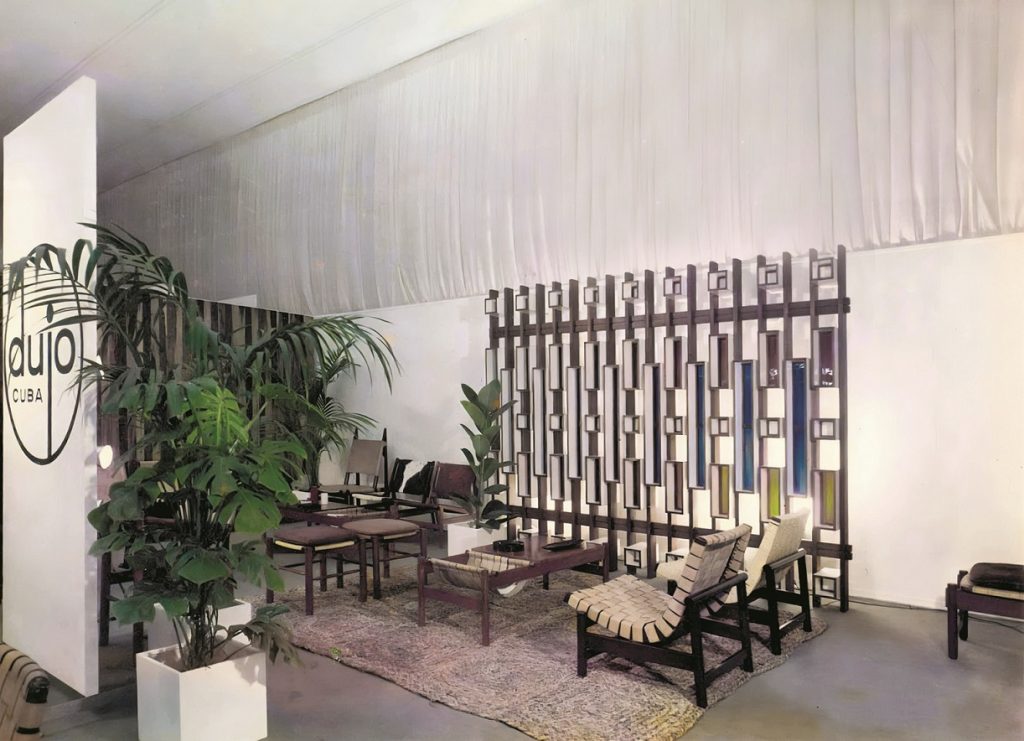
Dujo Muebles showroom at the Salon International du Mueble de Paris, 1967. Collection Laura Córdoba
This exhibition is the first museum presentation on Cuban mid-century design anchored by an under-acknowledged collection of furniture and furnishings, examples of which have not been exhibited off the island.
Focused on the decades immediately following the Cuban Revolution (1959), A Modernist Regime: Cuban Mid-Century Modern Design presents a small but prolific cohort of artists, designers, and architects who responded to the demands of a newly centralized economy, including the material constraints imposed by ensuing embargoes, popular demands for more equitable access to goods, and initial excitement about the role modern design could play in shaping a new society.
The exhibition includes the pioneering work of designers such as Clara Porset and the furniture produced through the Dujo brand and its successor line EMPROVA, led by Gonzalo Córdoba and María Victoria Caignet. In the 1960s, Dujo continued the trajectory of pre-revolutionary mid-century design to produce unique pieces that featured indigenous cultural references and materials, such as local woods and fibers, and utilized the country’s skilled carpentry workshops. By the mid-1970s, the EMPROVA line of furniture and furnishings utilized modular designs to help fulfill growing domestic demand.
The exhibition also features designs and prototypes created by the Light Industry Group led by designers Reinaldo Togores, María Teresa Muníz Riva, Eva Bjõrkland, and Heriberto Duverger, who along with others explored contemporary furniture intended for mass production with an emphasis on modularity, utilizing new techniques and technologies, such as particleboard and flat pack assembly, embracing a design-for-all ethos.
Rounding out the exhibition are a presentation of remarkable posters created for OSPAAAL (the Organization of Solidarity with the Peoples of Asia, Africa, and Latin America), as well as examples of modern architecture that emerged after the Revolution—which helped establish Cuba’s presence on the international stage.
Whether through architecture, graphic design, or furniture, A Modernist Regime: Cuban Mid-Century Design is a fascinating story of how modernism was transformed through its contact with capitalist, socialist, and communist economies by negotiating the local and the global; untangling fact from propaganda; and understanding the forces of innovation and limitation on design.
A Modernist Regime: Cuban Mid-Century Design is complemented by A Modernist Regime: The Contemporary Cuban Lens, which features two presentations: Marco Castillo: The Hands of the Collector and Cuba Dispersa, in which contemporary artists respond to both this earlier design history and the loss of creative freedoms in Cuba today. These exhibitions tell a cautionary tale of how Cuban modernism in design parallels the country’s existential authoritarian conflicts that resulted in a dictatorship that persists today. This trajectory of government control over the production of art, architecture, and design reaches its apex in Cuba today, where artists and other creatives are routinely censored, imprisoned, and exiled.
Virtual Tour of A Modernist Regime: Cuban Mid-Century Design
A Modernist Regime: Cuban Mid-Century Design and A Modernist Regime: The Contemporary Cuban Lens are organized by Cranbrook Art Museum and curated by Abel González Fernández and Laura Mott, Chief Curator, with Andrew Satake Blauvelt, Director, and Andrew Ruys de Perez, the Jeanne and Ralph Graham Curatorial Fellow. The exhibitions are generously supported by the Gilbert Family Foundation, the Andy Warhol Foundation for the Arts, the National Endowment for the Arts, the Clannad Foundation, the George Francoeur Art Museum Exhibition Fund, Marc Schwartz & Emily Camiener, Karen & Drew Bacon, Jennifer & Brian Hermelin, Kelsey & Evan Ross, and ArtMembers of Cranbrook Art Museum.Media Inquiries:
Julie Fracker
Director of Communications
Office: 248.645.3329
jfracker@cranbrook.edu

Copyright © 2026 Cranbrook Art Museum. All rights reserved. Created by Media Genesis.